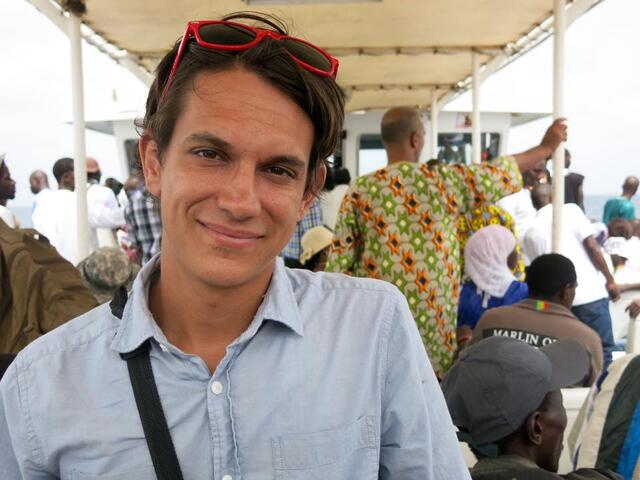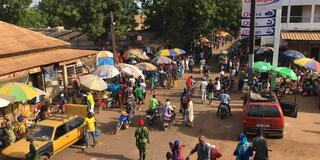
Taxi To Teranga

The Raphael Smith Memorial Prize is given in memory of Raphael Smith, a member of the Class of 1994 who died in a motorcycle accident while retracing his stepfather’s adventure of motorcycling from Paris to Tokyo. The prize, established by his family and friends, is awarded annually to two second-year SIPA students for travel articles that exemplify the adventurism and spirit of SIPA.

The warm, rich air of West Africa embraced me as I walked down the jetway and across the tarmac at the westernmost tip of the continent. It was the end of the rainy season; the atmosphere was hot and muggy. Everything was moving in slow motion—until I walked out the terminal doors and into the teeming streets of Dakar, Senegal. A dozen hawkers, in a fierce bid to sell phone credit, exchange currency, and offer “bargain” deals for taxis, rushed me at once. Blindsided at first, I swiftly recovered and reached out to a tall man offering taxi services. He started the negotiation:
“My friend, ten thousand is good!”
“Ten thousand,” I countered, “Are you crazy? Two thousand is a better price.”
He looked at me as if I had insulted his mother. “That is not good.”
After an especially brutal bargaining session in which accusations of tight-fistedness and scamming were exchanged, I followed Amadou to his car, my wallet significantly lighter. We loaded my baggage into his bashed-up yellow taxi—a relic right out of 1980s Paris festooned with stickers of Senegalese religious leaders and colorfully painted praises to Allah in Arabic, Wolof, and French.
As the car sputtered to life I wondered if the haggling had damaged any potential friendship, but after a brief moment he asked:
“Where are you from?”
“The United States.”
Ah, America is very nice! I want to go there.”
“I hear Senegal is nice too.” He smiled. “You speak truth. Senegal is the land of teranga.”
Suddenly, we jerked off the tarmac and onto a narrow sand path. My heart skipped a beat.
“Amadou, is this the road?” I asked, an unmistakable hint of panic in my voice.
We sat in silence for a moment as the taxi struggled through the sand, weaving between half-finished houses with rebar sticking out the roofs slicing the soft moonlight. After a minute Amadou informed me of our new schedule: “We’ll go to my house, eat food, then I’ll take you to the garage.”
I was slightly unsettled. We had just met 10 minutes ago, and I had to catch a bus soon.
Your bus won’t leave until 5 a.m.; we have two hours. Come eat, then wash before your next voyage.”
As I started to protest he cut me off: “Also, teranga means hospitality.”
Teranga, I was soon to discover, is taken very seriously in Senegal. Anyone within shouting distance of a household in the hours around lunchtime will be given a spoon and fed until full. A stranger in a village at sunset will be offered a bucket to wash, food to eat, and a bed for the night.
We pulled up outside the unfinished wall that enclosed Amadou’s house and walked through the corrugated metal door. On the left we passed a squat concrete structure I assumed was the bathroom area, and on the right an open-air kitchen protected from the elements by a jumble of sheet metal and wooden posts. In the far back, a bare grey building of two rooms provided a crowded sleeping space for eight people. In the center of the compound an old man was fast asleep on a thin mattress shrouded by a mosquito net.
While Amadou lacked material comforts, I soon discovered he was rich in kindness and generosity.
Amadou presented a well-worn plastic chair. “Sit down,” he insisted. “We’ll eat now. Let me get my wife.”
I objected, not wanting to wake his wife at 3 a.m., but he ignored me and rushed into her bedroom.
“Come meet my new friend! Also, we are hungry, is there any leftover dinner?”
Amadou’s wife, a tall, gracious woman named Aissatou, introduced herself before stumbling half-asleep to the kitchen to heat leftovers. Meanwhile, Amadou drew water from the well and fetched his prayer rug. As Aissatou blew the dull red coals under her cooking fire back to life, Amadou washed his hands and feet, then looked at me.
“Tonight, you will eat ceebu jen.”
Aissatou brought out a large metal bowl and placed it on a stool in front of me. Inside was rice cooked in a broth of oil, onions, and tomato and topped with an assortment of fish and vegetables. Meanwhile, Amadou had unfurled his prayer rug and oriented his body, and soul, towards Mecca.
Aissatou presented a spoon and insisted I start eating. After Amadou finished praying, he sat across from me and began eating from his side of the bowl. Aissatou brought cups of cold water and a tray of chilled mango slices. Minutes later I happily slurped down the last slice of mango and broke into a wide grin. Amadou laughed, then looked at my hands sticky with mango juice and motioned towards the bathroom.
“Wash your whole body if you want,” he chuckled as I closed the door. In the simple bathroom area, a bucket of water, soap, and a towel were waiting for me. I smiled, overwhelmed by their hospitality.
After my bucket bath, Amadou said it was time to go. I started thanking them profusely for their hospitality and reached into my pocket to grab my wallet, but Aissatou interrupted me.
“Stop. We are together. This is Senegal, the country of teranga.”
This story appears in the most recent issue of SIPA Magazine, published in October 2020.